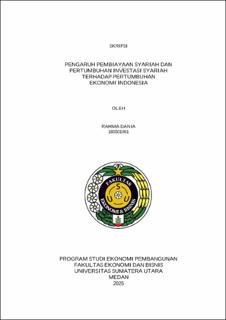| dc.contributor.advisor | Irsad | |
| dc.contributor.author | Dania, Rahma | |
| dc.date.accessioned | 2025-10-06T03:01:57Z | |
| dc.date.available | 2025-10-06T03:01:57Z | |
| dc.date.issued | 2025 | |
| dc.identifier.uri | https://repositori.usu.ac.id/handle/123456789/108969 | |
| dc.description.abstract | This study aims to analyze the effect of Islamic Financing and Islamic
Investment on Indonesia’s Economic Growth using the Autoregressive Distributed
Lag (ARDL) method. The data used are quarterly time series data from 2014 to
2024. The data obtained from official sources such as the Otoritas Jasa Keuangan
(OJK), Badan Pusat Statistik (BPS), and Bank Indonesia (BI).
The result show that partially, Islamic Financing has no significant effect
on Indonesia’s Economic Growth. Meanwhile, Islamic Investment has a
significant effect on Economic growth. Simultaneously, both Islamic Financing
and Islamic Investment have a significant effect on Indonesia’s economic growth.
Based on the cointegration test, there is a long term relationship between
Islamic Financing, Islamic Investment, and Economic Growth. However, in the
long term relationship, only Islamic Investment has a significant effect on
Indonesia’s Economic Growth. | en_US |
| dc.language.iso | id | en_US |
| dc.publisher | Universitas Sumatera Utara | en_US |
| dc.subject | Islamic Financing | en_US |
| dc.subject | Islamic Investment | en_US |
| dc.subject | Economic Growth | en_US |
| dc.title | Pengaruh Pembiayaan Syariah dan Pertumbuhan Investasi Syariah Terhadap Pertumbuhan Ekonomi Indonesia | en_US |
| dc.title.alternative | The Impact of Islamic Financing and Islamic Investment Growth On Indonesia's Economic Growth | en_US |
| dc.type | Thesis | en_US |
| dc.identifier.nim | NIM180501061 | |
| dc.identifier.nidn | NIDN0003057103 | |
| dc.identifier.kodeprodi | KODEPRODI60201#Ekonomi Pembangunan | |
| dc.description.pages | 92 Pages | en_US |
| dc.description.type | Skripsi Sarjana | en_US |
| dc.subject.sdgs | SDGs 8. Decent Work And Economic Growth | en_US |


